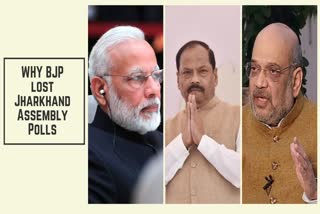Hyderabad: With Jharkhand joining the growing list of states slipping out of BJP's rule, the party now governs a mere 35 per cent of the country's landmass in comparison to over 71 per cent during its peak in 2017 when it was in power in the entire Hindi-speaking heartland.
Its string of losses in states despite the massive victory in the April-May Lok Sabha elections may force the party's top brass to revisit its strategy for the assembly polls as it prepares for the upcoming battles in Delhi and Bihar.
The percentage of population being governed by the BJP in the states, either on its own or with its allies, now stands at around 43 per cent from over 69 per cent two years back, data analysis show.
Reasons for BJP losing the Jharkhand Assembly Election
370, Mandir' vs Local Issues
Maharashtra and Haryana elections showed that voters chose local issues over national ones in state elections. Jharkhand elections seems to have followed the pattern. While BJP's star campaigners like PM Narendra Modi, Amit Shah, Yogi Aditynath talked about issues like Article 370, Ram Temple Verdict or Citizenship Act in their rallies, it seems the issues did not excite the voters enough for them to give BJP a majority in the state.
ARROGANCE OF RAGHUBAR DAS
Raghubar Das had been in power earlier too as a minister in previous BJP government and had been winning his Jamshedpur East constituency consistently. But when he was hand-picked by Narendra Modi-Amit Shah duo in 2014, he got a booster dose but people in Jharkhand complained: "power got to his head".
Even the BJP leaders in Jharkhand agree that Raghubar Das's image of a "rude" politician hurt the party in the state. The videos showing Raghubar Das yelling at commoners and officials have gone viral on many occasions in the past five years. One of such videos, showed a gaffe where Raghubar Das was heard saying "Jharkhand will be the first adivasi-mukt state".
UNITED OPPOSITION
After facing and defeating a fractured opposition 2014, BJP had to face a united front this time as the major opposition parties– Jharkhand Mukti Morcha (JMM), Congress and Rashtriya Janta Dal (RJD) - formed an alliance. This made the Jharkhand elections a direct contest between the BJP and the Alliance. In 2014, the combined vote share of Congress and JMM was higher than the BJP-AJSU election in as many as 14 seats. The Jharkhand Vikas Morcha (JVM) and 'frenemy' AJSU also cut into BJP's vote share in many seats. All this meant that despite increasing their vote share (from 31.26% in 2014), BJP lost the close contests in many seats.
TRIBAL ANGER
Jharkhand was created as a tribal state in 2000 after a very long agitation by leaders like Shibu Soren, the father of chief ministerial aspirant Hemant Soren and the founder of Jharkhand Mukti Morcha.
Though tribal vote share is less than one-third, Jharkhand emotionally remains a tribal state, where the image of Raghubar Das government became of one government that is anti-tribal in nature.
In 2014, the BJP-led alliance had won 13 out of 28 assembly seats reserved for Scheduled Tribe candidates. Even in the Lok Sabha election, the BJP won three of the five seats reserved for Scheduled Tribes in Jharkhand. However, two of these victories came with very slim margins.
This time around, the JMM won more than 20 of these seats - a clear case of tribals moving from the BJP camp to the JMM side.The amendment to the land acquisition law was seen as tribals as an assault on their rights by the BJP government. Creation of land banks confounded the tribal voters further.
Pathalgadi movement was another issue that hurt the BJP in Jharkhand. This was an expression that demanded that the rights of tribals must be recognised by the government of the day. The BJP was seen acting against the tribal sentiment. The anti-conversion bill was another troubling aspect. The tribal Christians, who had voted for the BJP-AJSU alliance in 2014 saw the anti-conversion bill as a move to target them.
IGNORING ALLIES
This was the first state election since the creation of Jharkhand in 2000 that the BJP contested the polls alone. It junked its oldest ally in the state, the All Jharkhand Students Union Party, whose Sudesh Mahto tried till the very last moment to have a pre-poll tie-up with the BJP.
The BJP leadership, then smarting under the Maharashtra experience of having been "ditched" by 35-year-old ally Shiv Sena, decided to go solo in Jharkhand. The party, however, did not put up its candidate against Sudesh Mahto at Silli seat in Ranchi.
The trend from the counting of votes in Jharkhand shows that the BJP would have been in advantageous position had it conceded to demands by the AJSU in the assembly election. The BJP has improved its own vote share but it was in the fray against a combined Opposition grand-alliance of the JMM, the Congress and the RJD.
